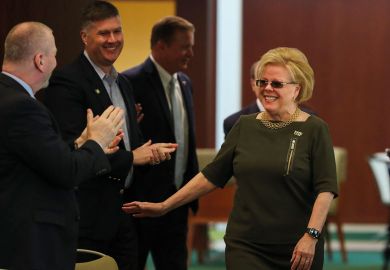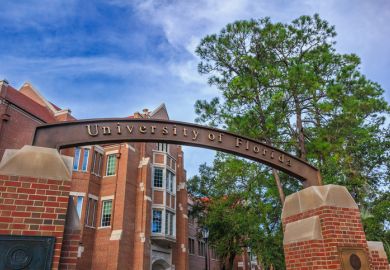Republican leaders in the US state of Florida have floated an idea to directly involve trustees in faculty hiring, exploiting what experts see as a major vulnerability for institutions nationwide in an era of deepening partisan interference.
Trustees of US universities have long been understood as boards of prominent citizens who meet on occasion to provide oversight while typically leaving institutions to manage their own affairs.
The emerging idea in Florida is to appoint trustees with significantly more partisan orientations and then encourage them to more aggressively exercise the explicit or de facto powers they already hold over university operations, down to the level of faculty hiring decisions.
“It’s an unguarded back door” for ideological critics of US higher education, said Jack Schneider, an associate professor of education at the University of Massachusetts Lowell.
The contours of the idea were set out in a legislative draft, discovered by a local investigative journalist and attributed to the office of Florida’s governor, Ron DeSantis.
Mr DeSantis, widely viewed as a top candidate for the US presidency in 2024, has been engaged in a running series of attempts to use state power to restrict academic freedom, including a failed bid to block three University of Florida professors from testifying against his position in a voting rights case.
The draft plan attributed to Mr DeSantis reiterates that trustees are responsible for hiring faculty, then points out that they are not bound by recommendations of faculty or anyone else. While the legal language notes the board can delegate its hiring authority to the institution’s president, it would require the board to vote on each selection.
The plan also suggests a greater concentration of power in state-wide governing boards that oversee all public institutions, including expanded rights to initiate investigations of university presidents, veto budgets, fire employees and review degree programmes, without allowing the delegation of such powers to individual campuses.
The head of the faculty senate at the University of Florida, Amanda Phalin, said that in all important state functions – such as law enforcement, revenue and taxes, and environmental protection – “civil servants who are subject-area experts work hand in hand with elected officials in management and oversight”.
“The same should be true in education,” said Dr Phalin, who also serves on the university’s board of trustees. “The great public universities in the state of Florida are also staffed with highly qualified faculty and administrators, and the state should continue to take advantage of their expertise.”
An alarming element of the proposal attributed to Mr DeSantis, Dr Schneider said, was that it doesn’t represent a major departure from current legal realities. As such, he said, it suggests a far more clever and potentially effective means of asserting partisan control over universities and what they teach and study than cruder efforts such as trying to fire individual faculty members or ban particular books or curricula. State officials usually hold the power to appoint trustees across the US.
“Here I just worry that what they have figured out is that faculty ultimately don’t have the power to hire other faculty, even though that’s how things usually play out,” Dr Schneider said.
“Not only will you not have the public relations issue” of overtly fighting lecturers, he said, “you’ll also probably get them to silence themselves far more effectively, in a much broader manner, than if you dictated a particular set of guidelines around how they needed to be silenced, because their fear will lead [to this tactic] being, in many cases, far more comprehensive”.
Register to continue
Why register?
- Registration is free and only takes a moment
- Once registered, you can read 3 articles a month
- Sign up for our newsletter
Subscribe
Or subscribe for unlimited access to:
- Unlimited access to news, views, insights & reviews
- Digital editions
- Digital access to THE’s university and college rankings analysis
Already registered or a current subscriber?








